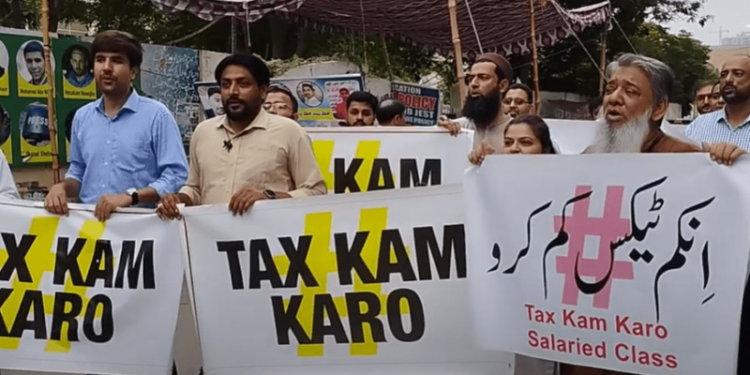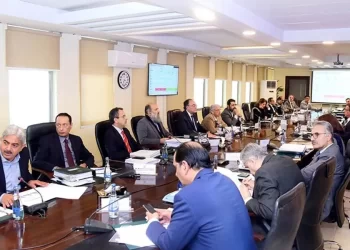As the government commenced preparations for the upcoming budget, the tax-burdened salaried individuals have jointly submitted set of proposals to the Ministry of Finance, urging the government to double the limit of wages exempted from income tax to Rs1.20 million a year.
Currently, a person earning up to Rs600,000 yearly is exempted from the income tax.
“Salaried individuals are already struggling with stagnant wages amidst historically high inflation, making it difficult to maintain a reasonable standard of living,” the Salaried Class Alliance Pakistan wrote in its budget proposals.
Fear comes alive: all salaried persons earning over Rs50k a month to bear higher taxation in FY25
They also urged the government to restore tax incentives that were previously available on investment in shares, mutual funds and insurance, and remove the additional 10% surcharge for the people working in formal sectors of the economy through the budget for the next fiscal year 2025-26.
“We write to respectfully highlight the growing concerns of the salaried class in Pakistan regarding the escalating tax burden and the need for a more equitable tax system that aligns with the economic realities faced by the citizens.”
The alliance reported that the tax collection from the salaried segment in Pakistan witnessed a significant surge from Rs76 billion in 2019 to the estimated Rs570 billion in 2025.
“While we commend the government’s commitment to enhancing revenue collection, it is important to note that this increase has disproportionately impacted the salaried class of our country.”
They further proposed the ministry to adjust the tax slabs for salaried individuals to align with the prevailing cost of living and global best practices.
Govt plans to reduce financial burden on salaried class in upcoming budget: FM Aurangzeb
“(At) least reinstate the tax rates to pre–Finance Act 2024 position including removal of additional surcharge of 10%. Surcharge is of penal nature which should not be imposed on the compliant taxpayers.”
The salaried individuals requested to raise the medical allowance exemption limit from 10% to 25% to reflect current healthcare costs.
“Introduce commuting and related allowances, allowing a 15% deductible allowance to cover commuting and other unavoidable employment-related expenses,” the budget proposals read.
The removal of tax credits and deductible allowances through Finance Act, 2022 including those related to investments in shares, mutual funds, sukuk, life insurance, and health insurance “further strained the financial resilience of salaried individuals”, they said.
Pakistan’s salaried group comes out on the streets, but after work hours
Moreover, the situation aggravated by the significant increase in tax rates introduced vide the Finance Act, 2024 including additional surcharge of 10%, which compounded the hardships faced by salaried workforce, as per the alliance statement.
“This has forced a large number of salaried class (individuals) to migrate abroad for better job opportunities and a standard of living. The elimination of deductible allowances on profits from loans by scheduled banks or non-banking finance institutions regulated by the SECP (Securities and Exchange Commission of Pakistan) has further diminished available financial relief avenues.”
While the current 10% medical allowance and its reimbursement are fully exempted under Clause 139 of Part I of the 2nd Schedule of the Income Tax Ordinance, 2001, “the allowance has not kept pace with inflation”.
“Furthermore, no deductions are being allowed to this class for its expenses incurred to earn its salary income unlike other taxpayer groups. Additionally, the annual exempt threshold of Rs600,000 a month has remained unchanged despite significant inflation over the past few years,” it said.
While comparing the tax exempted monthly salaries and allowances in Pakistan with regional countries, the alliance reported that India was giving such exemption on INR 700,000 (equivalent in Pakistani currency to Rs2.34 million a year) along with deductible allowances on medical expenses, home loans, and investments, the statement read.
Salaried individuals: Aurangzeb signals possible tax slab overhaul
Bangladesh has provided income tax exemption on BDT 350,000 (or Rs890,000) along with various deductible allowances for salaried employees. Vietnam is giving the tax exemption on VND 132,000,000 (or Rs1,57 million) along with deductible allowances on personal and dependent deductions. Nepal has exempted income tax on NPR 500,000 for individuals (or Rs1.05 million) and NPR 600,000 for couples (or Rs1,26 million) along with deductible allowances on medical expenses, retirement savings and education expenses, it added.
“It is evident from the comparison that Pakistan’s tax system, with its relatively lower exemption limits and absence of meaningful deductions, places an inequitable burden on salaried taxpayers, rendering the system regressive.”
The alliance urged the government to intensify its efforts to widen the tax net and bring the undocumented sector into the formal taxation framework.
“Doing so will not only alleviate pressure on compliant taxpayers but also ensure sustainable revenue growth and equitable fiscal policy,” it said.









